Gold of Our Fathers - [30]
The perishing afternoon heat seemed to make everything still as they walked, the brush softly crunching underfoot. A rhythmic chugging noise slowly became louder, different from the now-familiar excavator sound.
“Ticki-ticki-ticki-ticki,” Dawson said, imitating the sound. “What’s that?”
“Dredging pump, sir,” Obeng said. “This kind of mining is different from the one where they found the dead Chinaman.”
After several hundred meters, they began a slight decline into a valley and the view opened up beyond a clump of trees to reveal a river below them. About ten young men were crowded on a barge secured to one bank. The ticki-ticki was from a filthy, smoking diesel pump, also on the barge.
Facing the barge was a smaller vessel with two boys on it. Together they used a long pole to stab and churn the riverbed, increasing the amount of gravel to the pump. The river was a murky, yellowish brown.
“You see how those boys are churning the riverbed?” Obeng said to Dawson, pointing. “That makes it easier for the pump to suck up mud and gravel. Then the gravel is washed and maybe they can get some small gold at the end of the day.”
Dawson was trying to get a grasp of how much-or small-that amount of gold could be. “How much can the workers make?” he asked Obeng.
Obeng shrugged. “Most days just a few cedis. Sometimes nothing. Don’t forget, the owner takes most of the profit. But what is sad, sir, is that the tiny amount these boys earn is more than they made in the hometowns they came from. So this is why they stay, doing this dangerous work.”
It was a stark truth. Elsewhere in Ghana, street children eked out a meager living in urban centers like Accra, and they had similar stories: no work, and nothing to do in the villages they hailed from.
As Dawson watched the dredging, he reflected that he found this method of gold mining most intimidating because he could not swim and had an abiding fear of deep water. He spotted an eddy around the sandbar adjacent to the barge, which to him meant that a person could be swept away into the clutches of the wider river as it gathered strength and depth farther downstream.
One of the guys on the sandbar spotted Obeng, waved at him, and started his way toward them by plunging into the water between the bar and the bank. The level reached the top of his chest, even though he was quite tall, and Dawson could tell that the current was exerting a pull. He shuddered.
The depth of the river at the crossing point the man had chosen wasn’t the only thing that caught Dawson’s attention. The man had slipped off his shorts, left them at the sandbar and crossed the river stark naked, emerging completely exposed and in full view of his coworkers. He swept excess water off his body and sauntered to a clump of rocks to put on another pair of shorts waiting for him. Evidently this was the norm and galamsey boys were not in the least bit bashful. The man, in his early twenties, called out to Obeng with a familiarity that demonstrated that they knew each other, and walked in their direction with the same casual gait.
“Please, we can go down,” Obeng said to Dawson.
From where they stood, the drop to river level was a few meters, and steep, so they had to jump, their feet imprinting the soft, squelchy loam. They covered the rest of the way to meet Obeng’s friend, whose name was Brave. He was lean and muscled from hard physical work and rather fair colored with a broad, flat face. He and Obeng shook hands, snapped fingers, and traded a couple pleasantries, and then Obeng introduced him to Dawson.
“Akwaaba,” Brave said in Twi.
But Dawson had guessed he was Ewe because Ewes loved names like “Marvelous,” “Beauty,” “Grace,” and “Charity.” He replied to Brave in Ewe.
Brave laughed, slapping palms with Dawson in delight. “Are you Ewe?”
“Half Ewe, half Fante.”
“Oh, wonderful.”
But to be fair to Obeng, who didn’t speak Ewe, Dawson and Brave went back to Twi, the default Ghanaian language.
“You know Kudzo Gablah, right?” Obeng asked Brave.
He nodded. “Yes please. He’s from Keta, my hometown.”
“We’re looking for him.”
“Is that so? Please, isn’t he working at Dunkwa?”
Obeng shook his head. “Nana Akrofi said he came to Aniamoa, so we thought maybe he was at this site.”
“Oh, okay,” Brave said. “He used to be with us, but no longer.”
An older man came up to them who turned out to be the foreman.
“I have all my papers,” the foreman said defensively in response to the detectives’ inquiries about Kudzo. “This is a legal site, and I don’t deal with troublesome boys like that Gablah. I told him a long time ago that I didn’t want him working here.”
“Relax,” Dawson said with a smile. “It’s not you we are investigating. Why did you not want Kudzo working with you?”
“Hot temper,” the foreman said in English. “Too hot. He fought with me; he fought with all these guys.” He gestured to his workers. “I don’t know what is wrong with him.”
“I see,” Dawson said, wondering if this was going to be a short case. Did Kudzo kill Bao in a fit of anger?
“Please,” the foreman said, switching back to Twi, “if you think he’s around the Aniamoa area, then you should go into the town and ask.”
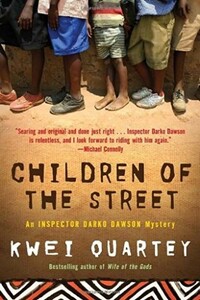
"Searing and original and done just right… Inspector Darko Dawson is relentless, and I look forward to riding with him again." – Michael ConnellyIn the slums of Accra, Ghana's fast-moving, cosmopolitan capital, teenagers are turning up dead. Inspector Darko Dawson has seen many crimes, but this latest string of murders – in which all the young victims bear a chilling signature – is the most unsettling of his career. Are these heinous acts a form of ritual killing or the work of a lone, cold-blooded monster? With time running out, Dawson embarks on a harrowing journey through the city's underbelly and confronts the brutal world of the urban poor, where street children are forced to fight for their very survival – and a cunning killer seems just out of reach.
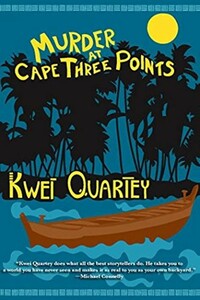
At Cape Three Points on the beautiful Ghanaian coast, a canoe washes up at an oil rig site. The two bodies in the canoe – who turn out to be a prominent, wealthy, middle-aged married couple – have obviously been murdered; the way Mr. Smith-Aidoo has been gruesomely decapitated suggests the killer was trying to send a specific message – but what, and to whom, is a mystery.The Smith-Aidoos, pillars in their community, are mourned by everyone, but especially by their niece Sapphire, a successful pediatric surgeon in Ghana's capital, Accra.
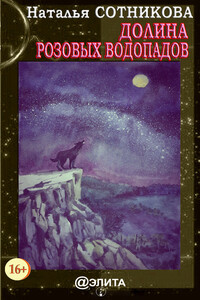
Однажды в руки безработной журналистки Екатерины Голицыной и её друга Николая Артюхова попадает странная флешка с видеозаписью. Известный американский писатель Майкл Доусон просит помочь ему в поисках исчезнувшей жены, Лии, родители которой погибли от рук китайской секты «Чёрное Братство». Следы Лии ведут в Россию.Старая китайская легенда неожиданно оживает в наши дни. Маленький научный городок Техногорск становится центром борьбы добра и зла. Оборотни, карлики, московский вор в законе, всемогущий мэр города и сам Магистр «Черного Братства».Кто может противостоять им? К тому же Николай исчезает самым странным образом.
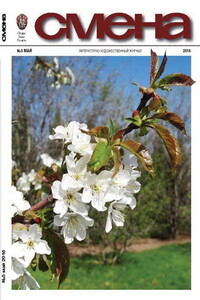
Ирину Александрову в последнее время преследовали одни несчастья: смерть дяди, гибель тети, странные голоса по ночам, толчок в спину под колеса поезда — все эти события были связаны между собой. Но как — ответа не было. А ощущение чего-то страшного, неотвратимого, что должно произойти, нарастало.
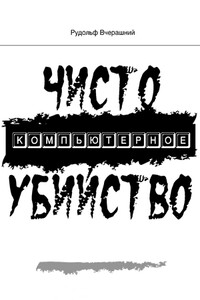
Заместитель командира воинской части в/ч № 755605 — собственно воинской частью был научно-исследовательский институт военно-морского ведомства — капитан первого ранга Гаврилов был обнаружен мертвым в своем рабочем кабинете. Прибывшая опергруппа не обнаружили каких-либо следов, отпечатков и других зацепок. Дело было поручено следователю военной прокуратуры Паламарчуку Василию Аполлинарьевичу.
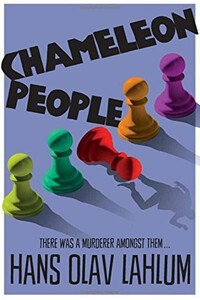
From the international bestselling author, Hans Olav Lahlum, comes Chameleon People, the fourth murder mystery in the K2 and Patricia series.1972. On a cold March morning the weekend peace is broken when a frantic young cyclist rings on Inspector Kolbjorn 'K2' Kristiansen's doorbell, desperate to speak to the detective.Compelled to help, K2 lets the boy inside, only to discover that he is being pursued by K2's colleagues in the Oslo police. A bloody knife is quickly found in the young man's pocket: a knife that matches the stab wounds of a politician murdered just a few streets away.The evidence seems clear-cut, and the arrest couldn't be easier.
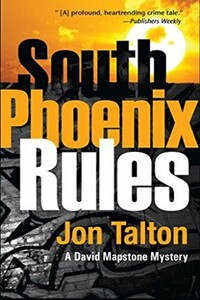
A handsome young New York professor comes to Phoenix to research his new book. But when he's brutally murdered, police connect him to one of the world's most deadly drug cartels. This shouldn't be a case for historian-turned-deputy David Mapstone – except the victim has been dating David's sister-in-law Robin and now she's a target, too. David's wife Lindsey is in Washington with an elite anti-cyber terror unit and she makes one demand of him: protect Robin.This won't be an easy job with the city police suspicious of Robin and trying to pressure her.
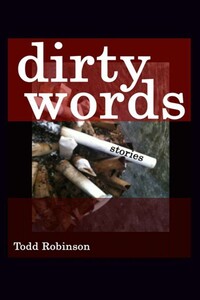
From the creator of the groundbreaking crime-fiction magazine THUGLIT comes…DIRTY WORDS.The first collection from award-winning short story writer, Todd Robinson.Featuring:SO LONG JOHNNIE SCUMBAG – selected for The Year's Best Writing 2003 by Writer's Digest.The Derringer Award nominated short, ROSES AT HIS FEET.THE LONG COUNT – selected as a Notable Story of the Year in Best American Mystery Stories 2005.PLUS eight more tales of in-your-face crime fiction.